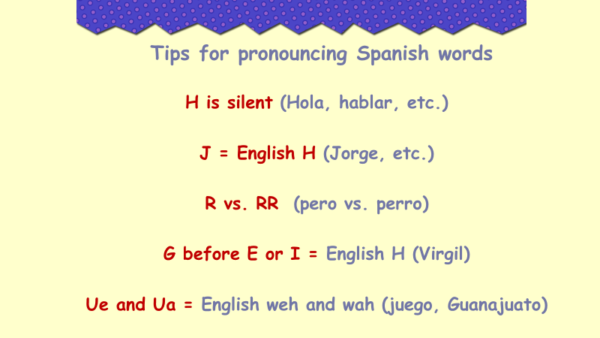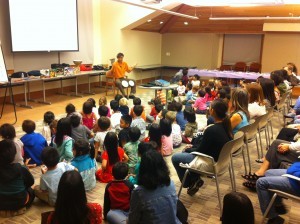Children Benefit from Multicultural Books Starring Foreign Words!
See if you can answer this two-part word quiz:
- Which word originated in South Asia: picture, teacher, jungle or chocolate?
- Which word originated in South Africa: snack, shack, trek, or steak?
(Answers below.)

I thought of these questions to kick off a recent workshop. It was part of a whirlwind tour through elementary schools, Purdue University and the F.A.M.E. Arts Festival in Indiana—all Zoomed from the music room of my home in California. The workshop, for the College of Music and College of Education at Purdue, was titled “Engaging students with literature—starring foreign words!”
My hope was to inspire the future teachers to share multicultural literature in their future classrooms.
Why use multicultural books with “foreign” words?
Multicultural books can engage diverse students and help them relate to those of different backgrounds. They can also make English language learners feel validated and “seen,” confirming that books, and that that matter school, are for them, too.
But in the Purdue workshop, I wanted to explore a lesser known benefit: multicultural literature enriches students with words. It’s through contact with different or “foreign” cultures that English boasts so much richly nuanced vocabulary. According to Dictionary.com, English consists of around 80% “loanwords,” borrowed from 350 other languages around the world! (Remember, not too long ago, the sun never full set on the British Empire.)
How authors use foreign words in picture books
Authors of multicultural books use foreign phrases to convey instant meaning to children of a given background. And they use foreign words to capture the imagination of everyone else. Picture book authors may use foreign words to introduce food items (“moussaka”), family relations (“babushka”), and exclamations (“Aiyah!”). And we may use foreign words when no English equivalent existis, or to re-introduce vocabulary thatEnglish has long since absorbed (words like tomahawk, kimono, rodeo, gazelle, señor, mademoiselle…)
Exposure to foreign words makes kids better spellers
Examining “foreign” words and phrases has the potential to help kids become better spellers. In my latest book Jazz Fly 3: The Caribbean Sea, for instance, French-speaking insects repeat “Bonjour” and “merci beaucoup.” Once kids know that the “ou” is pronounced “oo,” it’s easier for them to remember how to spell a whole “group” of words that include “soup,” “tour,” “coupon” and “ghoul.”
“Foreign” words are everywhere!
“Foreign” words are everywhere!
“Foreign” or loanwords in English are everywhere you look. “Loot” comes from Hindi, “cookie” from Dutch, “rodeo” from Spanish, Remember, for a long time the sun never set on the British Empire! It’s through contact with different or “foreign” cultures that English boasts so much richly nuanced vocabulary. According to Dictionary.com, English consists of around 80% “loanwords,” borrowed from 350 other languages around the world!
Answers to the two-part quiz above
Were you able to indentify the words from South Asia and South Africa? Drumroll, please….The word originating in South Asia is “jungle,” derived from the Hindi word “jangal,” meaning dense trees and vegetation. Think of the stuff British colonists wanted cut back from their manicured gardens in India. And “trek” was the word that originated in South Africa. This word is derived from the South African Dutch verb “trekken,” meaning to pull or travel.
Pronouncing foreign words with confidence during read-alouds
So why in class do we sometimes hesitate to share multicultural read-alouds with foreign words? Few teachers care for the awkward sensation of reading aloud words they can’t pronounce. But as new teachers discover soon enough, many multicultural picture books include glossaries with pronunciation. We can also key in phrases in Google Translate and click “pronounce” for further clues. (The app is getting better all the time.) And sometimes we can ask the students right in front of us for help! Children and parents who actually speak the language may be thrilled with the novel chance to teach the teacher.
Take away
Here’s the take away I tried to instill about sharing multicultural books with foreign words. These sorts of books can really resonate with diverse classrooms. Besides validating underrepresented students, they can improve the vocabulary, and even spelling, of all students since over time, many of these so-called “foreign” words become English. So the benefits of sharing multicultural books with foreign words outweigh the hazard of an occasional mispronounced phrase.
Hints for pronouncing Spanish words
In the workshop, I didn’t have the time (or expertise) to offer pronunciation guidance for all the languages I’d have liked (Chinese, Arabic, Russian, sigh.) But the participants seemed to appreciate my hints for pronouncing Spanish words. at least. ¡Buena suerte! (Good luck!) with these two slides from my Powerpoint:




